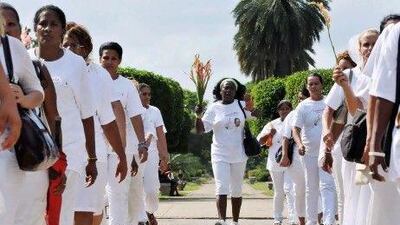HAVANA // Cuba has released dissidents from the Ladies in White activist group, after detaining 50 of them for several hours ahead of a visit next week by Pope Benedict, a member of the group said yesterday.
Magaly Norvis Otero Suarez, a member of the outlawed human rights group, said that its leader Berta Soler, and "almost" all of the other detained activists jailed on Sunday had been set free overnight.
Police took away Ms Soler and three dozen supporters of the Ladies in White group hours before they were to take part in a regular march down Quinta Avenida in the leafy Miramar neighbourhood of Havana.
"They were arrested," said Angel Moya, Ms Soler's husband and a former political prisoner himself. Ms Soler was also detained briefly Saturday evening, he said.
About 30 other Ladies supporters did make it to the march, which began peacefully, but state security agents moved in when the Ladies tried to extend the protest into streets they do not normally enter. All were escorted onto a bus belonging to state security. By Sunday evening, some had been released and some driven back to their homes.
The Ladies in White formed in 2003 after authorities jailed 75 intellectuals, activists and social commentators before sentencing them to long prison terms. All have since been freed and many have gone into exile.
Cuba has cleared its jails of most political prisoners, but human rights groups say Raúl Castro, the president and brother of the longtime leader Fidel Castro, has stepped up short-term detentions and other forms of harassment against the island's tiny opposition.
Cuba denies it holds any political prisoners and claims the dissidents are common criminals and mercenaries paid by Washington to stir up trouble. It scoffs at western criticism of its human-rights record, saying its socialist system provides citizens with free health care, education and many other subsidies, while capitalist countries are plagued by poverty.
The detentions come just more than a week before a March 26-28 visit by Pope Benedict, who is likely to encourage the government to adopt increased religious, political and human-rights protections during his tour, at least privately. It also comes days after Jaime Ortega, the Roman Catholic cardinal in Cuba, asked police to remove a group of 13 opposition members who had occupied a church in Central Havana for two days.
While the church won assurances that the group members would not be prosecuted, its endorsement of the raid and hardline stance throughout the standoff was derided by many dissidents, even those who had opposed the initial occupation.
While many praise Mr Ortega for mediating the release of political prisoners in 2010 and occasionally speaking out in favour of greater economic and political freedom on this Communist-run island, others say he has not done enough.

